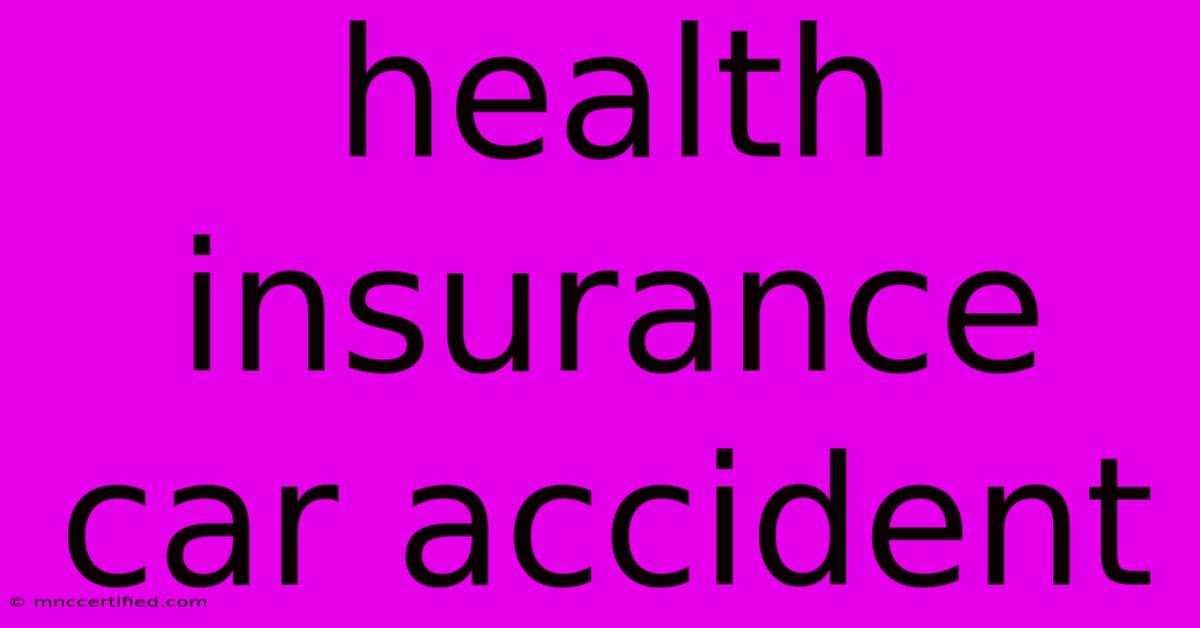Health Insurance Car Accident

Table of Contents
Health Insurance and Car Accidents: What You Need to Know
Getting into a car accident is stressful enough, but navigating the complexities of health insurance afterward can feel overwhelming. Understanding your coverage and rights is crucial to ensuring you receive the necessary medical care without facing crippling financial burdens. This guide breaks down how health insurance interacts with car accident claims.
Understanding Your Health Insurance Coverage After a Car Accident
Your health insurance policy plays a significant role in covering medical expenses following a car accident. However, the extent of coverage depends on several factors:
- Your Policy Type: Different health insurance plans (HMO, PPO, POS) have varying levels of coverage and network restrictions. Understanding your plan's specifics is paramount. Check your policy documents carefully, or contact your insurer directly.
- Deductibles and Co-pays: You'll likely have to meet your deductible before your insurance kicks in to cover a significant portion of your medical bills. Co-pays are also typically required for each doctor's visit and treatment.
- Pre-existing Conditions: If you have pre-existing conditions that were aggravated by the accident, your insurer might limit coverage for treatment related to those conditions. However, this often hinges on the specifics of your policy and the accident's impact on your pre-existing condition. This is an area where legal counsel might be beneficial.
- Out-of-Network Providers: Using out-of-network providers will usually result in higher out-of-pocket costs. If possible, seek treatment within your network to minimize expenses.
What Your Health Insurance Likely Covers:
Generally, health insurance covers medically necessary treatment resulting from a car accident, including:
- Emergency Room Visits: Emergency care is usually covered regardless of whether the provider is in-network.
- Hospital Stays: Hospitalization expenses are generally covered, but the specifics depend on your plan.
- Surgeries: Necessary surgical procedures are typically covered after meeting your deductible and co-pay requirements.
- Physical Therapy and Rehabilitation: Rehabilitation services are often covered to aid your recovery.
- Medications: Prescription medications prescribed by your doctor are usually covered.
What Your Health Insurance Might Not Cover:
- Cosmetic Procedures: Unless deemed medically necessary to address accident-related injuries, cosmetic procedures are unlikely to be covered.
- Certain Alternative Therapies: Coverage for alternative therapies (e.g., acupuncture, chiropractic care) may vary significantly depending on your plan.
- Pre-existing Conditions (with caveats): As mentioned earlier, aggravation of pre-existing conditions might be partially or fully excluded.
The Role of Your Car Insurance
Your car insurance plays a separate but equally crucial role. While your health insurance covers your medical expenses, your car insurance typically covers other aspects of the accident:
- Property Damage: Your collision coverage will repair or replace your damaged vehicle. Liability coverage will repair the other party's vehicle if you are at fault.
- Liability Coverage: If you caused the accident, your liability coverage will pay for the other driver's medical bills and property damage, up to your policy limits.
- Uninsured/Underinsured Motorist Coverage: This coverage protects you if you're hit by an uninsured or underinsured driver. It can help cover your medical bills and other expenses not covered by the other driver's insurance.
How Health and Car Insurance Interact
Often, there's a coordination of benefits between your health and auto insurance. Your health insurance might pay for your medical bills first, and then your car insurance can reimburse them or cover what your health insurance didn't. This is where things can get complex, so careful documentation is key.
Navigating the Claims Process
- Seek Immediate Medical Attention: Get to a doctor or hospital as soon as possible after the accident, regardless of how minor your injuries seem.
- Report the Accident to Your Insurers: Notify both your health and car insurance companies promptly.
- Document Everything: Keep records of all medical bills, doctor's visits, treatment plans, and communication with your insurance companies.
- Consider Legal Counsel: If your injuries are serious or the accident was caused by someone else's negligence, consulting with a personal injury attorney is strongly recommended.
Key Takeaways
Understanding how your health insurance and car insurance interact after an accident is vital for a smooth recovery process. Thoroughly review your policies, document everything meticulously, and don't hesitate to seek professional help when needed. Being proactive and informed empowers you to navigate this challenging situation more effectively.
Keywords: health insurance car accident, car accident insurance coverage, health insurance claims car accident, car accident medical bills, auto insurance health insurance, health insurance after car accident, uninsured motorist coverage, liability insurance car accident, collision insurance car accident, pre-existing conditions car accident, medical treatment car accident, personal injury attorney car accident.

Thank you for visiting our website wich cover about Health Insurance Car Accident. We hope the information provided has been useful to you. Feel free to contact us if you have any questions or need further assistance. See you next time and dont miss to bookmark.
Featured Posts
-
Lions Game Brown Montgomery In
Nov 29, 2024
-
Tottenham Hotspur Vs As Roma Starting Xi
Nov 29, 2024
-
Farm Liability Insurance Cost
Nov 29, 2024
-
National Dog Show A Guide
Nov 29, 2024
-
Car Hits South Carolina Mc Donalds
Nov 29, 2024